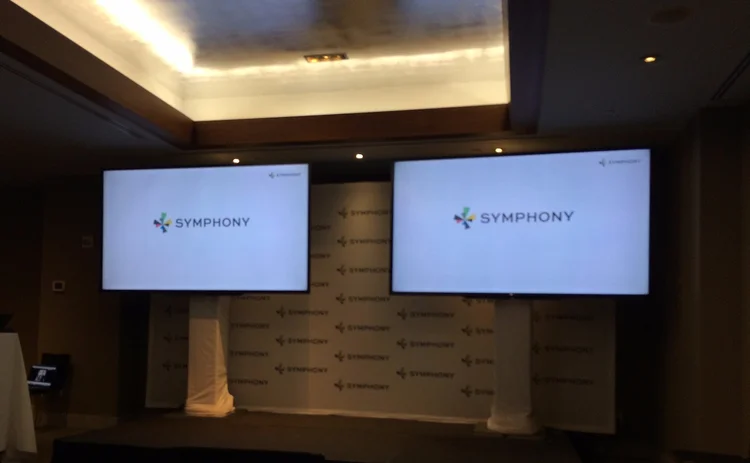Symphony: Incipient Challenger or Bloomberg Duplicator?
After a worldwide launch that included announcements of content partnerships with three firms, Dan DeFrancesco looks at the future of Symphony and if it's really as different as it is being touted.

I couldn't help but laugh to myself a little bit this week as I sat in on Symphony's worldwide launch of its messaging platform. The startup communications service, which is backed by some of the biggest banks on Wall Street, was touting content partnerships with Dow Jones, McGraw Hill Financial and Selerity.
This is the beginning of great change, argued Symphony CEO and founder David Gurle, citing a Winston Churchill quote at the presentation. The workflow platform is going to alter how Wall Street functions, said executives from the new partners.
And in that moment, I thought to myself, the pigs were now walking on their hind legs.
Before I dive in, first there is some needed context. We have to jump back to July when WatersTechnology US editor Anthony Malakian and I were invited to Symphony's New York office to chat with Gurle and see a demo of the platform.
Gurle mentioned how subscribers of the Bloomberg terminal only used a small portion of all the features they paid for. By offering a messaging platform in an á la carte fashion, clients would be able to cut costs and pick and choose what kinds of services they wanted.
One of Symphony's goals, it seemed, was to unbundle the Bloomberg terminal. Now, it appears, it's simply building another one.
After leaving the office, I remember talking with Anthony about how likely it would be that Symphony could break into the market. It seemed Gurle and Symphony had a strong strategy: Take one portion of the Bloomberg terminal, build a better product than it currently offers and provide it at a fraction of the cost.
More than Messages
Fast forward to today and I can't help but feel a little curious about Symphony's content relationships with Dow Jones, McGraw Hill Financial and Selerity, and the direction they signal. Gurle has said over 100 companies have shown interest in either being integrated into Symphony or having the platform implemented on their products.
Gurle also threw out the term "Symphony Marketplace," a plan he said the vendor hopes to release in 2016.
One of Symphony's stated goals was to unbundle the Bloomberg terminal. But it increasingly appears that it's simply building another one.
Now let me pause here and say that I do like Symphony's platform. Full disclosure, I even recently signed up to its free chat version and got some of my colleagues to follow suit. It looks clean and is easy to use. Take that endorsement for what it's worth, considering I've never used Instant Bloomberg.
As it grows larger, Symphony seems to be focusing on making new features and applications available on its platform, as opposed to what got it so much buzz in the first place: the actual messaging service. Maybe the idea is that one leads to another?
The firm isn't exactly a large outfit at this stage. The strain of making sure more and more applications are compatible with Symphony surely won't go unnoticed. I hope the staff won't lose sight of making sure the bread and butter of the product─the actual communication service─doesn't suffer.
A Plan for the Future
Towards the end of Symphony's presentation on Tuesday, Gurle sat in with a panel. To close things out, the moderator, former Bloomberg editor Diane Brady, asked Gurle about what Symphony's long-term goals are.
When Gurle mentioned Symphony Marketplace, Brady pushed him on whether he felt Symphony identified more as a marketplace than a messaging tool.
Gurle's entire response, included below, is telling.
"I would say the marketplace is a natural extension of Symphony. We cannot do everything ourselves, and neither do we want to. We have our own specialty. We have an open-source foundation that is going to also bring a new perspective that we can't even imagine. Imagine all the different companies and technology coming to the foundation and adding new capabilities to Symphony. That's been fascinating to watch. It's been a whole industry transformation happening before our eyes. Maybe it's an operating system. The way I think about [an operating system] is that there is a piece of software that orchestrates through its own existence, and this is where the Symphony name comes from, a different constitutes of the software and it is kind of at the center of making these connections happen. And from the perspective I see the next operating systems to be very much like Symphony, in which we bring together the workflow and the components that make the work flow in a seamless way."
Obviously, that quotation indicates Gurle's plan for Symphony is to grow it beyond just a messaging service. A full-fledged OS is a far cry from a communications platform.
Gurle has made it clear Symphony doesn't plan on building additional applications on its own, and the platform will allow clients to pick and choose what features they want to add, but I wonder if that sentiment will last. How long before certain features are automatically included in the platform, driving up the price, which has been a big selling point?
Will Symphony ever come close to costing customers the $21,000 per user, per year that Bloomberg terminals do? Probably not.
But then again, after a while, sometimes two legs look better than four.
For a full recap on Bloomberg, Symphony and the messaging space, check out Anthony's highly informative September feature.
Only users who have a paid subscription or are part of a corporate subscription are able to print or copy content.
To access these options, along with all other subscription benefits, please contact info@waterstechnology.com or view our subscription options here: https://subscriptions.waterstechnology.com/subscribe
You are currently unable to print this content. Please contact info@waterstechnology.com to find out more.
You are currently unable to copy this content. Please contact info@waterstechnology.com to find out more.
Copyright Infopro Digital Limited. All rights reserved.
As outlined in our terms and conditions, https://www.infopro-digital.com/terms-and-conditions/subscriptions/ (point 2.4), printing is limited to a single copy.
If you would like to purchase additional rights please email info@waterstechnology.com
Copyright Infopro Digital Limited. All rights reserved.
You may share this content using our article tools. As outlined in our terms and conditions, https://www.infopro-digital.com/terms-and-conditions/subscriptions/ (clause 2.4), an Authorised User may only make one copy of the materials for their own personal use. You must also comply with the restrictions in clause 2.5.
If you would like to purchase additional rights please email info@waterstechnology.com
More on Emerging Technologies
Market participants voice concerns as landmark EU AI Act deadline approaches
Come August, the EU’s AI Act will start to sink its teeth into Europe. Despite the short window, financial firms are still wondering how best to comply.
Ram AI’s quest to build an agentic multi-strat
The Swiss fund already runs an artificial intelligence model factory and a team of agentic credit analysts.
Fidelity expands open-source ambitions as attitudes and key players shift
Waters Wrap: Fidelity Investments is deepening its partnership with Finos, which Anthony says hints at wider changes in the world of tech development.
Fiber’s AI gold rush risks a connection drop
In search of AI-related profits, investors flocked to fiber cables, but there are worrying signals on the horizon.
JP Morgan gives corporates an FX blockchain boost
Kinexys digital platform speeds cross-currency, cross-entity client payments.
BlackRock further integrates Preqin, Nasdaq and Osaka Exchange partner, and more
The Waters Cooler: SGX remodels data lake, ICE seeks tokenization approval, TNS closes Radianz deal, and more.
ICE to seek tokenization approval from SEC under existing federal laws
CEO Jeff Sprecher says the new NYSE tokenization initiative is not dependent on the passage of the US Clarity Act.
Waters Wavelength Ep. 346: TS Imagine’s Andrew Morgan
This week, Andrew Morgan of TS Imagine talks with Wei-Shen about how fixed income trading behavior is changing.








